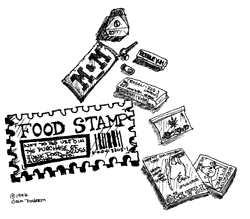![]()
![[ OPINIONS ]](/images/fall97/opinionsf97.gif)
![]()
By Eric E. Clingan
Arizona Daily Wildcat October 21, 1997
Stamping Out Fraud
![[Picture]](04_2_i.gif)
Eric E. Clingan |
Two T-bone steaks, a one pound package of M&M's, three bags of Ruffles,
a case of Coca-Cola and a pack of Bubble Yum were the items being purchased
from Fry's by the two teen-aged girls reeking of marijuana smoke on a particular
Sunday afternoon last week. While this array of junk food and expensive
meat was noteworthy for its questionable lack of nutritional value, what
really caught the attention and disgust of on-lookers was its buyers' method
of purchase - food stamps!
According to legislative records, the intent of the Food Stamp Act of 1977 was to "Promote the general welfare and safeguard the health and well-being of the nation's population by raising levels of nutrition among low-income households."
Although the nutritional value of a pound of "M&M's" may be hotly debated, especially among college students during midterms, the Food Stamp Program and its $30 billion budget is, without question, one of the most frequently defrauded and abused anti-poverty programs in existence.
The federally-run food stamp program's fraud is difficult to detect. Federal efforts to clean up the program have dealt mainly with investigations of counterfeiting, instead of the more frequent, but harder to detect, form of fraud known as "Transference." Transference is simply the selling of those food stamps allotted to an individual for less than face value, often with the intention of using the proceeds to buy alcohol, cigarettes and illegal drugs such as crack, heroin and marijuana.
The question of abuse is less defined by legal statutes than by simple common sense. In fact, the teen-agers mentioned earlier serve as an example of excess within the system resulting from a lack of such thought. While the liberal elite's anti-poverty "experts" decry the current "low" level of funding for food stamps, they clearly turn a blind eye to how those coupons are frequently used. Consider, if a typical family's monthly food stamp allotment is, say $200, how much sense does it make to squander those stamps on T-bones at $5.99/lb vs. ground beef at $1.49/lb? Indeed, if the intent of the program is to ensure a nutritional safety net among the poor, why are potato chips given equal purchasing status as fruits and vegetables and soda pop treated as if it is milk?

In an effort to end fraud among food stamp users, legislators should begin by looking to another more successful income support program called "WIC." The WIC program provides assistance to "Women with Infant Children."
Unlike foods stamps, a WIC check specifies exactly what may be purchased with it by listing items such as "64 oz. Milk, 2 Cans Frozen Orange Juice, etc." Additionally, an identification card and signature are required to process a WIC check. This system truly goes the distance to ensure that infants are supplied with necessities for healthy growth.
Next, using the WIC system as a starting point, Congress should allow tax breaks to farmers and food manufacturers in return for providing distinctive vouchers which would specify items by brand name and size such as "One 2-lb Package of Tyson Chicken Leg-Quarters." These vouchers would then be distributed, in lieu of food stamps, to those who qualify according to current income levels and their submitting to a drug test. Finally, by printing UPC codes on the vouchers to match a UPC code on the user's identification card, fraud would soon be eliminated while abuse is severely curtailed. Today's technology, which provides us with UPC coupons automatically generated by cash registers within seconds of our purchases, suggests such a system would be cost-effective as well.
Like so many liberal income assistance programs, the Food Stamp Program is consistently targeted for abuse and fraud by the very people it sets out to help. As a $30 billion drain on our country's budget, it predictably allows for too much fraud, abuse and waste, as well. By enlisting the help of this country's food producers and utilizing today's technology, the federal government could more efficiently provide for those in need while addressing the valid concerns of others behind them in the check-out line.
Eric E. Clingan is a senior majoring in political science.



